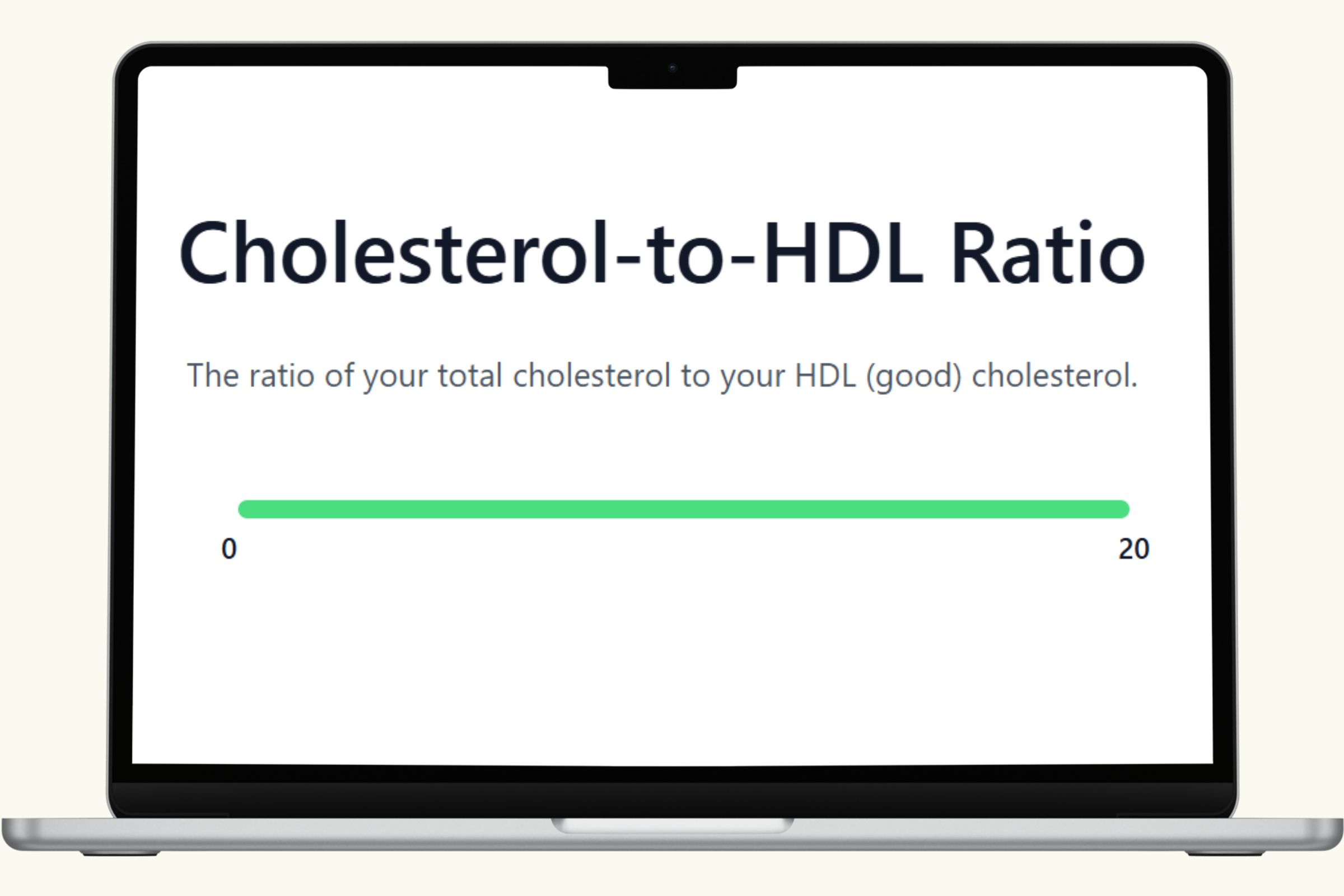Total Cholesterol to HDL Ratio Blood Test
The Total Cholesterol to HDL (TC:HDL) ratio is one of the most important markers for understanding cardiovascular risk and overall heart health. Unlike looking at total cholesterol alone, this ratio compares all the cholesterol circulating in your blood to the protective “good” cholesterol known as HDL. By providing a more accurate picture of lipid balance, the TC:HDL ratio helps identify whether your cholesterol is working with or against you when it comes to long-term heart and metabolic health.
The PlexusDx Diabetes & Heart Health Blood Test includes this biomarker to help you understand your cardiovascular risk profile in a simple, convenient way. Using an at-home dried blood spot collection on an ADX card, you can access clinical-quality insights without visiting a lab or clinic. This makes it easier than ever to take charge of your heart and metabolic wellness.
What the TC:HDL Ratio Measures
The TC:HDL ratio is calculated by dividing your total cholesterol level by your HDL cholesterol level. Total cholesterol includes LDL (“bad” cholesterol), HDL (“good” cholesterol), and triglyceride-related cholesterol. HDL works by removing excess cholesterol from your arteries and transporting it back to the liver for processing and removal, lowering the risk of plaque buildup. The ratio shows how much of your cholesterol is protective compared to how much may contribute to cardiovascular disease.
- Total Cholesterol (TC): The overall measure of cholesterol in your blood, including both LDL and HDL fractions.
- HDL Cholesterol: Known as “good” cholesterol, HDL helps clear cholesterol from your arteries.
- TC:HDL Ratio: The balance between harmful and protective cholesterol. A lower ratio signals better heart health.
Why the TC:HDL Ratio Matters
Traditional cholesterol testing often focuses on LDL or total cholesterol alone. However, research shows that the TC:HDL ratio is a stronger predictor of heart attack and stroke risk. For example, someone with borderline high total cholesterol may still have a favorable ratio if their HDL is high enough. Conversely, someone with normal total cholesterol but very low HDL may be at increased risk.
This ratio matters because it reflects not just how much cholesterol you have, but how well your body is equipped to manage it. Improving your TC:HDL ratio has been associated with reduced cardiovascular events, better blood vessel function, and overall metabolic resilience.
Commonly Used Reference Ranges
Different guidelines and labs may report slightly different cutoffs, but the following ranges are commonly used:
- Desirable (Low Risk): < 3.5
- Average Risk: 3.5 – 5.0
- Increased Risk: > 5.0
In functional and integrative medicine, tighter ranges are often used to identify subtle imbalances before disease develops:
- Optimal: 2.0 – 3.0
- Borderline: 3.0 – 3.5
- At Risk: Above 3.5
For example, someone with a ratio of 2.8 may be considered optimal from a functional health perspective, even if their total cholesterol appears elevated by standard lab ranges.
How the Test is Collected
The PlexusDx Diabetes & Heart Health Blood Test uses an at-home dried blood spot (DBS) collection method with an ADX card. This means you only need a simple finger prick to collect a few drops of blood. Once the card is filled, you mail it to the lab in a prepaid envelope. The sample is stable during shipping, and results are processed using the same advanced methods as traditional venous blood draws.
This method is:
- Convenient and private
- Less invasive than a venous blood draw
- Accurate and clinically validated
- Ideal for routine monitoring over time
What Can Influence Your TC:HDL Ratio?
Several factors can impact your cholesterol balance and overall ratio:
- Diet: High intake of saturated fats, trans fats, and refined carbohydrates can increase LDL and total cholesterol. Omega-3 fats, fiber, and plant sterols can improve HDL and lower LDL.
- Exercise: Regular aerobic and resistance training raises HDL and improves the ratio.
- Weight: Obesity and central fat distribution negatively affect cholesterol ratios, while weight loss can improve them.
- Smoking: Lowers HDL cholesterol, worsening the ratio.
- Alcohol: Moderate intake may increase HDL, but excess raises triglycerides and total cholesterol.
- Genetics: Inherited lipid disorders can affect both LDL and HDL levels, making genetic testing a valuable complement.
- Medical conditions: Diabetes, hypothyroidism, and metabolic syndrome often disrupt lipid balance.
Improving Your TC:HDL Ratio
Fortunately, lifestyle changes and sometimes medication can significantly improve this biomarker:
- Increase physical activity: Aim for at least 150 minutes of moderate aerobic exercise weekly, plus strength training.
- Choose heart-healthy fats: Emphasize unsaturated fats from olive oil, nuts, seeds, and fatty fish.
- Boost fiber intake: Soluble fiber from oats, legumes, and vegetables helps reduce LDL cholesterol.
- Limit refined carbs and sugars: These can raise triglycerides and lower HDL.
- Quit smoking: HDL often rises quickly after smoking cessation.
- Moderate alcohol: Small amounts may help, but excess is harmful.
- Medications: Statins, niacin, fibrates, and other drugs may be prescribed when lifestyle alone is insufficient.
Why Pair TC:HDL with Other Biomarkers?
While the TC:HDL ratio is powerful, it works best when viewed alongside other key biomarkers. The PlexusDx Diabetes & Heart Health Blood Test also measures markers like LDL, HDL, triglycerides, hemoglobin A1C, and fasting glucose. Together, these provide a full view of your cardiovascular and metabolic health, helping identify risks early and guiding personalized lifestyle or medical strategies.
Take Charge of Your Heart Health
The TC:HDL ratio is a critical measure of how well your body is handling cholesterol and protecting your cardiovascular system. By testing at home with PlexusDx, you gain the power to monitor your heart health on your own terms, catch problems early, and track progress as you make lifestyle changes.
Whether you are looking to prevent heart disease, manage diabetes risk, or simply optimize your long-term health, knowing your TC:HDL ratio is an essential step. With fast, accurate results and convenient at-home collection, PlexusDx makes it simple to take control of your cardiovascular wellness today.

Share:
LDL-HDL Ratio Blood Test